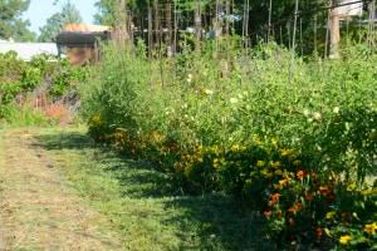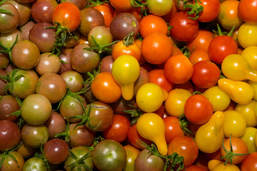
Now that we are well into the season, tomatoes in our kitchens have found their way into practically everything: they are star of the show in BLT’s and TLT’s (“T” for tempeh, for the vegetarians among us); they form the base for an endless variety of bright tangy garlicky sauces for sautéed green beans or pinto stews; and they foretell a year of good eating as they slow-cook down into tomato sauce for year-round cooking.
North Valley Organics off 12th Street is our first stop these days picking up produce on Tuesday mornings. A long, dusty or muddy, and at times rather high-clearance lane leads to the tomato oasis. Minor and Matthew and a small team of creative interns cultivate a small plot here, bounded by ditches lined with prickly pear and elms. These farmers are united in their shared concern for the biological life of soil, and they tend and feed, with the devotion of mother Sandhills. Scientific instincts and long attention to the inner workings of the soil has led this team to some unorthodox practices, like keeping weeds around. They see value in the weeds that come up between the crop rows during the growing season, and they mow the weeds and reintegrate this organic matter into the soil. The small size of their plot makes it feasible for them to forgo tilling, a practice which many agriculturalists regard as an unavoidable but soil-depleting means to prepare the soil for next year's crop.
North Valley Organics off 12th Street is our first stop these days picking up produce on Tuesday mornings. A long, dusty or muddy, and at times rather high-clearance lane leads to the tomato oasis. Minor and Matthew and a small team of creative interns cultivate a small plot here, bounded by ditches lined with prickly pear and elms. These farmers are united in their shared concern for the biological life of soil, and they tend and feed, with the devotion of mother Sandhills. Scientific instincts and long attention to the inner workings of the soil has led this team to some unorthodox practices, like keeping weeds around. They see value in the weeds that come up between the crop rows during the growing season, and they mow the weeds and reintegrate this organic matter into the soil. The small size of their plot makes it feasible for them to forgo tilling, a practice which many agriculturalists regard as an unavoidable but soil-depleting means to prepare the soil for next year's crop.

Minor and Matthew regularly share what they have discovered with other cultivators in demo-classes and seminars. Many thanks to these guys, and to all of you, for making our steady supply of in-season tomatoes possible.
Click here to download a PDF of this week's Newsletter!
Click here to download a PDF of this week's Newsletter!
